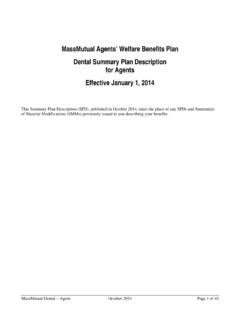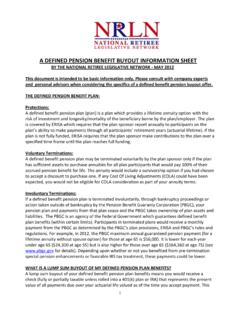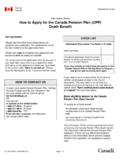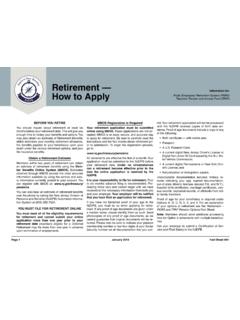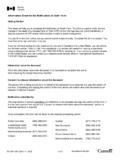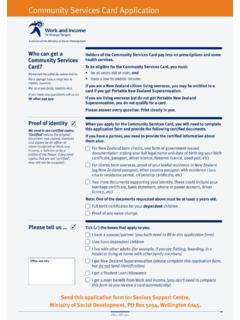Transcription of Instructions for Completing the Beneficiary Form
1 2017 Massachusetts Mutual Life Insurance Company (MassMutual), Springfield, MA 01111-0001. All rights reserved. 1217 Page 1 of 5 MassMutual pension Plan Instructions for Completing the Beneficiary Form The MassMutual pension Plan allows participants to name beneficiaries. If you are married, your spouse is automatically your primary Beneficiary . However, you may name someone else, provided your spouse consents. If you want your spouse to be your primary Beneficiary , please enter your spouse s information as the only primary Beneficiary . Your spouse does not have to consent to this and notarization is not needed. If you want to name someone other than your spouse, federal law requires that you get written approval from your spouse, witnessed by a Notary Public or Plan representative. Please write the name(s) of the other Beneficiary (ies) and other information under primary Beneficiary (ies) You may also name a secondary Beneficiary .
2 Your secondary Beneficiary (ies) is the individual(s) you choose to receive the proceeds of your death benefit in the event your primary Beneficiary (ies) predeceases you. If you don t name a Beneficiary , or all your beneficiaries predecease you, your benefit is payable to your estate. If you are single, you can name any primary Beneficiary (ies) you want. You may also name a secondary Beneficiary . Your secondary Beneficiary (ies) is the individual(s) you choose to receive the proceeds of your death benefit in the event your primary Beneficiary (ies) predeceases you. If you don t name a Beneficiary , or all your beneficiaries predecease you, your benefit is payable to your estate. If you are under age 35, your Beneficiary designation will be effective until January 1 of the year that you turn 35. Prior to this event (January 1 of your 35th year), you will be offered an opportunity to rename your Beneficiary .
3 If you do not complete a new Beneficiary form on or after January 1 of your 35th year and you are married, your federally recognized spouse will automatically become your Beneficiary , according to IRS regulations and the terms of the plan. Return completed form to: MassMutual Workplace Solutions, Box 219035, Kansas City, MO 64121-9062. You may change your Beneficiary designation at any time by Completing a new form. The plan recognizes the most recent form on file. Page 2 of 5 QPSA information for Spouses 1. What is a Qualified Pre-retirement Survivor Annuity (QPSA)? As a spouse of a participant in the MassMutual pension Plan, federal law gives you the right to receive a death benefit from the plan if your spouse dies before you, unless your spouse names another Beneficiary and you agree to that choice. You have the right to receive this death benefit if your spouse has earned retirement benefits under the plan and dies before he or she begins receiving those benefits.
4 You have the right to receive this periodic payment for the rest of your life, beginning no later than when your spouse could have begun receiving retirement benefits. The pre-retirement death benefit is a percent of the retirement benefit your spouse earns before death. The special death benefit is often called a qualified pre-retirement survivor annuity or QPSA benefit. Alternatively, the plan will pay this death benefit as an annuity based on your life only or in a lump sum, rather than as a QPSA. No death benefit will be paid unless the participant is vested. Example: Pat Doe dies at age 45 after becoming vested in a retirement benefit. If Pat had lived, Pat could have retired and begun receiving payments as early as age 45 under the plan s terms. The plan will pay a monthly benefit to Pat s spouse, Chris Doe, for the rest of Chris life. Chris has the right to begin receiving the benefit immediately or wait until a later date, but no later than when Pat would have been 65 years old.
5 Alternatively, Chris can receive the benefit as a lump sum. 2. What are your rights if you sign this form? Your right to the QPSA benefit provided by federal law cannot be taken away unless you agree to give up that benefit. If you agree to give up the QPSA benefit, the plan will pay this benefit to another person selected by your spouse. For example, if you agree, your spouse can have the death benefit paid to their children instead of you. Alternatively, your spouse can elect to have you and your children as beneficiaries with your consent, resulting in a smaller benefit paid to you. 3. Do you have to give up your right to the QPSA benefit? No. It is your personal decision whether you want to give up your right to the QPSA benefit. Your choice must be voluntary. 4. Can your spouse make future changes if you sign this agreement? If you sign this agreement, your spouse cannot change the Beneficiary named in this agreement unless you agree to the new Beneficiary by signing a new form.
6 If you agree, your spouse can change the Beneficiary at any time before benefits begin. You can refuse to allow your spouse to change the Beneficiary . However, your spouse can later revoke any nonspouse Beneficiary designation that you consented to, leaving you as the sole Beneficiary . Remember, you cannot revoke your consent after you sign it. Your decision is final. 5. What happens to this agreement if you become legally separated or divorced? You may lose your right to the QPSA benefit if you and your spouse become legally separated or divorced, even if you do not sign this agreement. However, if you become legally separated or divorced, you might be able to get a special court order (which is called a qualified domestic relations order or QDRO ) that specifically protects your rights to receive the QPSA benefit or that gives you other benefits under this plan. Page 3 of 5 MassMutual pension Plan Beneficiary Form Participant information XXX-XX- Name (Last, First, Middle) Social security Number MIP/Field Office (if active) Extension Date of change I hereby request that any benefit payable at my death under the MassMutual pension Plan be paid to the Beneficiary (ies) named below.
7 I understand that if I do not designate a percentage of benefit to multiple beneficiaries, my benefit will be split equally among the beneficiaries named: Primary Beneficiary (ies) Name(s) and Address(es) NAME DATE OF BIRTH SOCIAL security NO. ADDRESS % OF BENEFIT RELATIONSHIP NAME DATE OF BIRTH SOCIAL security NO. ADDRESS % OF BENEFIT RELATIONSHIP Your Secondary Beneficiary is the individual(s) you choose to receive the proceeds of your death benefit in the event your primary Beneficiary (ies) is (are) deceased. If you name more than two primary or secondary beneficiaries, please write see attached and attach a separate sheet of paper with the requested information and date. Secondary Beneficiary (ies) Name(s) and Address(es) NAME DATE OF BIRTH SOCIAL security NO. ADDRESS % OF BENEFIT RELATIONSHIP NAME DATE OF BIRTH SOCIAL security NO. ADDRESS % OF BENEFIT RELATIONSHIP Marital Declaration: I hereby declare that I am am not married.
8 I understand that this MassMutual pension Plan Beneficiary designation supersedes any previous designation. Participant s Signature Date Spousal Consent (only needed if spouse is not 100% primary Beneficiary ) I have read and understood the QPSA section of this form and consent to the Beneficiary designation set forth above. If I had any questions, they have been answered to my satisfaction. I understand that my spouse cannot change this Beneficiary designation (except to name me as sole Beneficiary ) unless I agree to the change. Spouse s Signature Date Notary Public Signed and subscribed before me on this _____ day of _____, 20___. My commission expires: _____ _____ Note: A retirement plan representative may witness your spousal consent in lieu of Public signature T395a 1217 Page 4 of 5 General Provisions 1. Upon the death of the participant, the death benefit shall be paid to the Primary Beneficiary (ies), if living when the Participant dies.
9 If no Primary Beneficiary is living when the Participant dies, the death benefit shall be paid to the Secondary Beneficiary (ies), if living when the Participant dies. 2. If no Primary Beneficiary or Secondary Beneficiary is living when the unmarried Participant dies, the death benefit shall be paid to the Executor or Administrator of the estate of the Participant. If no Beneficiary is properly designated by a married participant, the death benefit shall be paid to the spouse. 3. If two or more persons, at any time, are entitled to payment as the Primary Beneficiaries or if two or more persons, at any time, are entitled to payment as Secondary Beneficiaries, payment shall be made to them in the percentage shares designated by the Participant and if the Participant fails to specify each Beneficiary s respective interest, payment shall be made in equal shares. 4. If you designate two or more Primary Beneficiaries or two or more Secondary Beneficiaries and one or more of the Beneficiaries dies before you, benefits shall not be paid to the estate of the predeceased Beneficiary (ies) or to anyone claiming through the predeceased Beneficiary (ies) and the benefits payable to the surviving Beneficiary (ies) shall automatically be increased pro rata, unless you make a specific alternate Beneficiary designation.
10 5. If you designate two or more Primary Beneficiaries or two or more Secondary Beneficiaries and one or more of the Beneficiaries die after your death but before payment of the entire amount payable to such Beneficiary , the remaining benefits shall be paid to the Executor or Administrator of the estate of the predeceased Beneficiary (ies). If the Plan Administrator concludes that an Executor or Administrator shall not be appointed, the alternate payment provisions described under item 2 above shall apply. 6. Unless otherwise provided by law, any distribution to be made to a minor Beneficiary shall be made to the legal guardian of such minor. If a custodian is named under the Uniform Transfer to Minors Act or Uniform Gifts to Minors Act (UTMA/UGMA), any money payable to the minor shall be paid to the custodian. UTMA/UGMA means the law of the state of residence of the minor which applies to the naming of a custodian to receive a death distribution payable to a minor, whether it be entitled the UTMA/UGMA.


